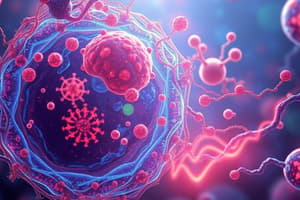Podcast
Questions and Answers
What is the function of the nucleus in a cell?
What is the function of the nucleus in a cell?
- Energy production
- Breaking down large molecules
- Protein synthesis
- Storage of DNA (correct)
Which organelle is responsible for packaging proteins and lipids?
Which organelle is responsible for packaging proteins and lipids?
- Chloroplasts
- Lysosomes
- Endoplasmic reticulum (correct)
- Mitochondria
Which organelle is involved in protein synthesis and modification?
Which organelle is involved in protein synthesis and modification?
- Lysosomes
- Nucleus
- Golgi apparatus (correct)
- Membrane
What is the main function of the cytoskeleton in a cell?
What is the main function of the cytoskeleton in a cell?
What is the function of lysosomes in a cell?
What is the function of lysosomes in a cell?
Which component of a cell is responsible for regulating the transport of nutrients and waste?
Which component of a cell is responsible for regulating the transport of nutrients and waste?
What is the process involving the transfer of electrons from electron donors to acceptors, generating ATP for energy storage?
What is the process involving the transfer of electrons from electron donors to acceptors, generating ATP for energy storage?
Which process involves cells dividing and multiplying to form new cells?
Which process involves cells dividing and multiplying to form new cells?
Which process involves a series of chemical reactions occurring inside cells to generate energy and maintain homeostasis?
Which process involves a series of chemical reactions occurring inside cells to generate energy and maintain homeostasis?
What is the method of transferring signals across membranes via second messengers such as cyclic AMP or calcium ions?
What is the method of transferring signals across membranes via second messengers such as cyclic AMP or calcium ions?
What is the process related to the generation of amino acids linked together to create functional proteins governed by mRNA transcripts?
What is the process related to the generation of amino acids linked together to create functional proteins governed by mRNA transcripts?
What contributes to the overall functioning of a cell and the functionality of the entire organism it belongs to?
What contributes to the overall functioning of a cell and the functionality of the entire organism it belongs to?
Flashcards are hidden until you start studying
Study Notes
Introduction to Cell Biology
Cell biology is a fundamental branch of biology that focuses on studying cells—the basic units of life. These tiny structures make up living tissues and organs, each consisting of specialized parts called organelles, which carry out unique functions within the cell. Understanding how cells function, reproduce, and interact with their environment is crucial to appreciating the complexity of life itself.
Key Components of Cells
At the heart of cell biology lies the concept of cellular organization. There are several essential components within a typical cell:
- Nucleus: The control center where DNA is stored and used to create new molecules.
- Organelles: Specialized compartments for carrying out specific functions, such as mitochondria for energy production and chloroplasts for photosynthesis in plant cells.
- Membrane: The boundary surrounding the cell and regulating transport of nutrients and waste.
- Cytoskeleton: The structural framework providing shape and allowing movement of the cell.
- Endoplasmic reticulum: Network of membranes involved in protein synthesis and modification.
- Golgi apparatus: Organelle responsible for packaging proteins and lipids before they are sent to their destined locations.
- Lysosomes: Digestive vesicles containing enzymes capable of breaking down large organic molecules.
These components often work together to facilitate a wide range of cellular processes, including metabolism, signaling pathways, and the transmission of genetic information.
Processes Within Cells
Understanding the dynamic nature of cells demands comprehension of several critical processes:
- Division and Reproduction: Cells divide and multiply to form new cells, either by binary fission or meiosis.
- Photosynthesis: Energy conversion performed by plants and algae through sunlight absorption.
- Electron Transport Chain: Transfer of electrons from electron donors to acceptors, generating ATP for energy storage.
- Protein Synthesis: Generation of amino acids linked together to create functional proteins governed by messenger ribonucleic acid (mRNA) transcripts.
- Metabolic Pathways: Series of chemical reactions occurring inside cells to generate energy and maintain homeostasis.
- Signal Transduction: Method of transferring signals across membranes via second messengers such as cyclic AMP or calcium ions.
Each of these processes contributes to the overall functioning of a cell and thus to the functionality of the entire organism it belongs to.
In summary, cell biology involves exploring the structure and function of individual cells, including their components, interactions, and the roles they play in supporting life. As a vital section of modern biology, cell biology continually advances our understanding of the most intimate details of living things.
Studying That Suits You
Use AI to generate personalized quizzes and flashcards to suit your learning preferences.




